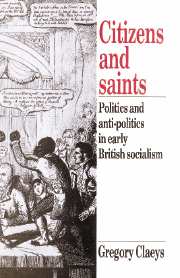Book contents
- Frontmatter
- Contents
- Acknowledgements
- List of Abbreviations
- Introduction:
- PART I THE ROOTS OF POLITICAL AND ANTIPOLITICAL SOCIALISM
- PART II SOCIAL SCIENCE, POLITY AND ECONOMY
- PART III THE ORIGINS OF SOCIAL RADICALISM
- 5 Owenism and the emergence of social radicalism, 1820–35
- 6 Owenism and Chartism, 1836–45
- 7 The legitimation of political socialism
- 8 Social radicalism, the state and revolution
- Bibliography
- Index
5 - Owenism and the emergence of social radicalism, 1820–35
Published online by Cambridge University Press: 04 December 2009
- Frontmatter
- Contents
- Acknowledgements
- List of Abbreviations
- Introduction:
- PART I THE ROOTS OF POLITICAL AND ANTIPOLITICAL SOCIALISM
- PART II SOCIAL SCIENCE, POLITY AND ECONOMY
- PART III THE ORIGINS OF SOCIAL RADICALISM
- 5 Owenism and the emergence of social radicalism, 1820–35
- 6 Owenism and Chartism, 1836–45
- 7 The legitimation of political socialism
- 8 Social radicalism, the state and revolution
- Bibliography
- Index
Summary
Given Owen's predominance over the early socialist movement and the relative orthodoxy of many of his chief lieutenants, it is not always easy to surmise how much disagreement existed among socialists on a range of important issues, such as religion, marriage and private property. Nonetheless Owenism obviously embraced a much wider spectrum of beliefs than those Owen himself was pleased to term ‘rational’. When, in the midst of the considerable clamour Owen had caused in the late summer of 1817, ‘a Plebeian’ informed W. T. Sherwin that ‘very few have ventured to claim the title of “Owenite”’, religious controversy was assumed to be responsible for such reluctance. Twenty years later, others would decline the title of ‘socialist’ because it was by now also widely identified with Owen's ostensibly licentious views on marriage. Nonetheless, Owen's opinions on these and other questions were also contested by many who otherwise remained loyal to the general trend of his thinking. This process continued even after the Rational Society, which officially adopted the name ‘Socialist’ in 1841, succeeded in enforcing a degree of orthodoxy upon its members.
Political thought and practice proved to be one of the areas which excited the greatest controversy within Owenism. A socialist heterodoxy in politics began to emerge in the mid-1820s around a variety of issues. Particularly contentious was the choice as to whether radical parliamentary reform should precede community-building or be understood as the chief means of attaining other socialist economic measures, or whether parliamentary reform itself should be regarded as insignificant compared to the need to supersede more traditional forms of democratic organisation.
- Type
- Chapter
- Information
- Citizens and SaintsPolitics and Anti-Politics in Early British Socialism, pp. 169 - 207Publisher: Cambridge University PressPrint publication year: 1989

